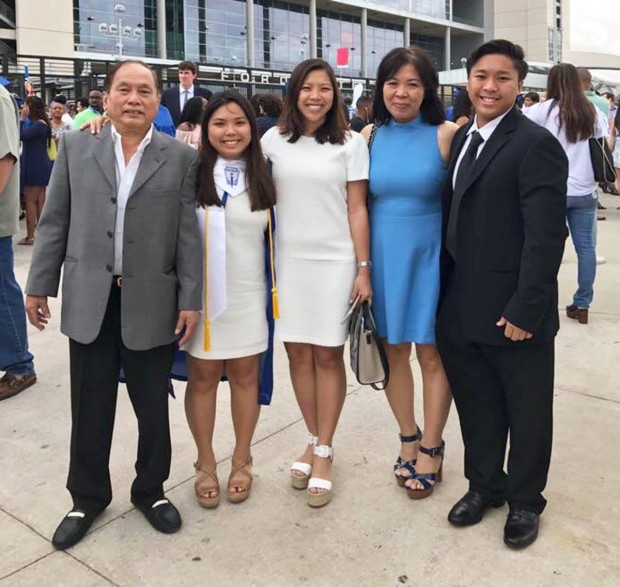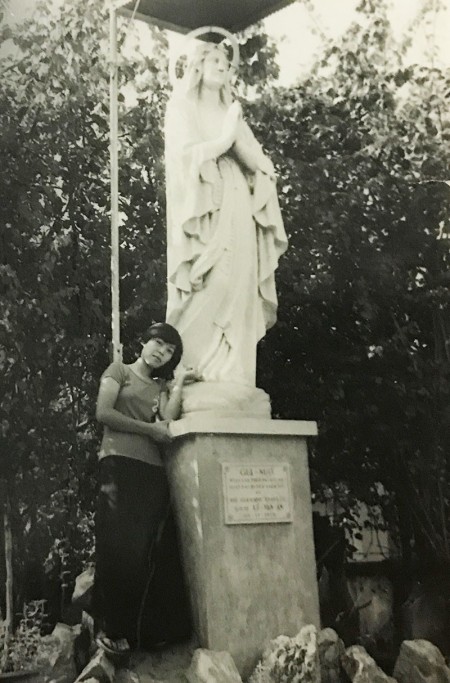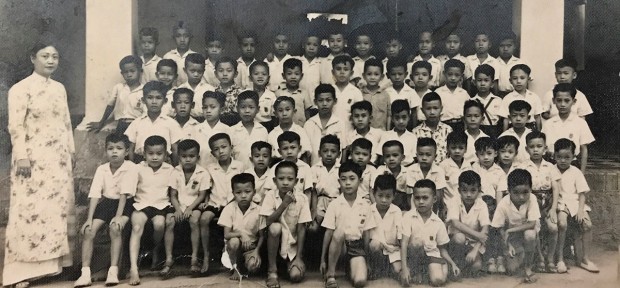Journey to America

A recent photo of the Duong family after Kimberly's graduation from Lamar High School. (From left) Kim Duong, Kimberly Duong, Tiffany Duong, Mai Nguyen and Andrew Duong.
I am a student at St. John’s School, my sister Kimberly is heading to Baylor University this fall and my older sister Tiffany, a graduate from The University of Texas at Austin, is currently working for JP Morgan. I live in West U and have been able to go on some unforgettable vacations and have had incredible opportunities.
None of this could have happened without my parents, Kim Duong and Mai Nguyen. The way they both got to this point in their lives wasn’t as easy as my path has been. Both of them went through events I can’t even imagine.
Below I will share some of the hardships my parents had to face in their journey to get to America and how it led them to where they are today.
Mai:
At only 14 years old, Mai and one of her brothers were told by their mother that they must leave Vietnam when the opportunity presented itself.
“The Communists started coming in and making life worse for us.” Nguyen said, “It wasn’t even a choice for us. The plan was to get to somehow get to America.”
She had grown up in a family with five brothers and one sister. Mai’s mother only sent her, age 14 and Duc Nguyen, age 16 because going in large groups made it easier for the police or government to track you down and send you back. Her mother stayed back in case Mai or her brother got sent back. America, the land of free, was the eventual goal.
Mai tried numerous attempts to make it to another country either by land or sea. There was less risk on land because she would be able to run and hide if caught by police, but on the ocean, there was no place to hide. After about 40 attempts and going to prison at least 15 times, Mai and her brother finally did it. Even though they accomplished their first goal, they still had a ways to go.
Mai, her brother and 50 other people desperate to escape boarded a small boat that was no larger than a canoe. People were forced to lay and sit on each other in order to fit. The members ranged from infants to older men or women. There was no room for food and fresh water, so everybody hoped their voyage from Vietnam to Malaysia would be short.
There was the risk of pirates from Thailand stopping the boat and taking women. Pirates were known to take women, rape them and either take them as prostitutes to sell or put them back on their boats. Fortunately for Mai, there was no sign of a pirate invasion.
On the third day of her journey, it began to rain. Mai couldn’t have been happier to feel the rain because it was enough to cease the pain from the lack of water.
“Everybody was happy and just opening their mouths. People would pull their shirts up to try to collect some water,” Nguyen said. “If it didn’t rain, I don’t know if we all would have survived the trip.”
On the fourth day, they reached a large oil rig at least 10 times the size of their tiny boat. The workers attempted to ignore the refugee-filled boat until Mai’s boat started sinking. Eventually they helped all 52 individuals up.
The boat members showed their gratitude and were sent to the mainland in Malaysia shortly after. Mai and her brother officially became refugees and stayed there for about six months. Both were eventually transferred to a camp in Sungai Besi for another six months to wait for their legal papers to be approved. Another transfer led them to the Philippines to learn English and the American culture.
At age 16, Mai’s stepfather sponsored her and her brother to come to America. In the Philippines, she boarded something she’d never seen in person before: a plane.
“I had heard about planes from others, but this was my first time seeing one and actually going inside,” Nguyen said. “Even though the flight to America was super long, it was worth it.”
In 1993, 11 years after Mai arrived in America, Mai sponsored her mother to come to Houston. Being away from her mother for a large portion of her life, a reunion seemed necessary.
She lived in Chinatown for a couple months until her brother and her found an apartment in Bellaire to live in. Eventually, she found a house in West U to live in and is still there with her family today.
Kim:
Unlike Mai, Kim came to America when he was older and more experienced in the world, but similar to Mai, the Communist party had a large impact on Kim’s decision to escape the country.
As a child, Kim was known as a troublemaker who would skip school at times and occasionally get in fights. Although he wasn’t the perfect child, he would score high on tests and was offered multiple scholarships to colleges.
Although he had the opportunity to leave Vietnam and go to Germany for school, he decided to join the Vietnam Air Force at 18 years old. After training and moving through the ranks for seven years, Kim ranked up and became a lieutenant.
At 25 years old, Communists started coming in and put all Vietnamese military officers in concentration camps. They referred to them as “reeducation camps” but the only thing Kim learned was how to take a beating. The cells the prisoners stayed in were undersized and unsanitary.
“The conditions were horrible. They rarely fed us, so we were hungry a majority of the time. When we did need medical assistance, it was never offered,” he said. “We would have to work most of the day and didn’t have much time to rest at all.”
To Kim’s surprise, after five years, they decided to let all the officers go.
After being released, he walked over to Ho Chi Minh City to see if he could find friends and family to stay with. The guards at the entrance of the city didn’t allow him to come in and he realized there was no use in trying to argue his way in. Kim knew some family that owned a ranch outside the urban areas of the city and headed over there as soon as possible. Living out in the countryside, his diet consisted of rice, noodles and various types of meat for three months.
Although he enjoyed his stay, he felt like he had to leave. He left off the coast in a wooden couch-sized boat with six other people.
“One day, some pirates stopped our boat. I was scared because we had heard about what they could do and how uncaring they are,” Duong said. “Luckily, we didn’t have any women or money on board so they decided to let us go. After 14 days, we reached Thailand.”
He stayed on the mainland as a refugee for six months. He was eventually transferred to Palawan Island for a year. He stayed for six months longer than he expected because President Ronald Reagan passed a law requiring refugees to learn some basic English and about American life.
Eventually he arrived in Houston, Texas in 1980 at the age of 32 and stayed with a family friend until he was able to find somewhere stable to live.
Now:
Kim and Mai met through some mutual family friends and got married in 1991. After having two daughters, Kimberly Duong and Tiffany Duong, they decided to buy a house in West U. In 2000, they had one more child, Andrew (me).
Today, my parents are successful and are able to live a comfortable life. My dad owns Pro Cleaners and Alterations, a dry cleaners shop in Sugar Land, and my mom does some freelance real estate.
My parents have taught me to appreciate how easy my life is compared to others around the world. After learning their stories, I really took this lesson to heart and it has allowed me to respect them more than ever.
Want more buzz like this? Sign up for our Morning Buzz emails.
To leave a comment, please log in or create an account with The Buzz Magazines, Disqus, Facebook, or Twitter. Or you may post as a guest.




